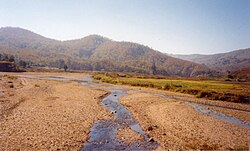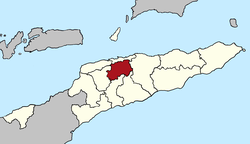Aileu Municipality
You can help expand this article with text translated from the corresponding article in German. (November 2010) Click [show] for important translation instructions.
|
Aileu | |
|---|---|
| |
 River in Aileu | |
 | |
| Coordinates: 8°43′S 125°34′E / 8.717°S 125.567°E | |
| Country | |
| Capital | Aileu |
| Administrative posts | |
| Area | |
• Total | 735.9 km2 (284.1 sq mi) |
| • Rank | 9th |
| Population (2015 census) | |
• Total | 48,837 |
| • Rank | 12th |
| • Density | 66/km2 (170/sq mi) |
| • Rank | 8th |
| Households (2015 census) | |
| • Total | 7,598 |
| • Rank | 13th |
| Time zone | UTC+09:00 (TLT) |
| ISO 3166 code | TL-AL |
| HDI (2017) | 0.613[1] medium · 6th |
| Website | Aileu Municipality |
Aileu (Portuguese: Município Aileu, Tetum: Munisípiu Aileu) is a municipality, and was formerly a district, of East Timor. It has a population of 48,554 (Census 2015) and an area of 737 km2.[2] The municipality's capital is also named Aileu. Its administrative posts are Aileu, Laulara, Lequidoe and Remexio.
Etymology
[edit]The word Aileu means "bent tree" in the local Mambai language.[3] According to legend, the root of a banyan fig tree (Ficus benghalensis) grew to maturity without a branch or leaf. The tree developed into a twisted shape that looked like a chair; its unique appearance made it famous, and eventually gave the community its name. Nowadays, the wooden chair is also the symbol of the municipality.[4]
Geography
[edit]Aileu is in the northwestern part of East Timor and is one of only two landlocked municipalities, the other being Ermera. It borders Dili to the north, Manatuto to the east, Manufahi to the southeast, Ainaro to the south, Ermera to the west, and Liquiçá to the northwest. It was formerly part of what is now the municipality of Dili but was split in the final years of Portuguese administration.
Politics
[edit]As part of the Timor-Leste Government decentralization program the former District of Aileu is now organised as the Municipality of Aileu, headed by a Municipal Administrator. The four former subdistricts are now organised as Administrative Posts.
Administrative posts
[edit]The municipality's administrative posts (formerly sub-districts) are:[5]
- Aileu Vila (place of capital)
- Laulara
- Lequido
- Remexio
Development
[edit]Aileu is the focus of several development programmes from NGOs, including WaterAid,[6] World Vision[7] and Plan International.[8] In May 2000 the Hume City Council and Moreland City Council and the communities in Melbourne Australia, established a friendship relationship with the Aileu Municipality, called "Friends of Aileu". The friendship relationship has been renewed periodically, with the signing of updated Friendship Agreements in 2005, 2010 and 2016.[9] and [10]
References
[edit]Notes
[edit]- ^ "Sub-national HDI - Area Database - Global Data Lab". hdi.globaldatalab.org. Retrieved 13 September 2018.
- ^ "Preliminary Results Population and Housing Census 2015 | STATISTICS TIMOR-LESTE".
- ^ Hull, Geoffrey (June 2006). "The placenames of East Timor" (PDF). Placenames Australia: Newsletter of the Australian National Placenames Survey: 6–7. Archived (PDF) from the original on 14 February 2017. Retrieved 4 June 2018.
- ^ "Perfil: 2. Toponímia" [Profile: 2. Toponymy]. Aileu Municipality (in Tetum). Retrieved 18 July 2022.
- ^ Gunn, Geoffrey C (2011). Historical Dictionary of East Timor. Lanham, Maryland: Scarecrow Press. p. 36. ISBN 9780810867543.
- ^ "2009 Message from Peter Dwan, Head of International Programs". WaterAid Australia. Archived from the original on 18 September 2012. Retrieved 7 October 2010.
- ^ "About us". World Vision. Archived from the original on 1 March 2012. Retrieved 7 October 2010.
- ^ http://www.plan.org.au/ourwork/asia/easttimor/water-sanitation-hygeine[permanent dead link]
- ^ "About Friends of Aileu". City of Moreland. Archived from the original on 20 February 2011. Retrieved 7 October 2010.
- ^ https://www.facebook.com/friendsofaileu/ [user-generated source]
Bibliography
[edit]- Aileu District Development Plan, 2002/2003 (PDF) (Report). April 2002. Archived from the original (PDF) on 28 March 2009. Retrieved 26 February 2022.
- Munisipio Aileu: Planu Estartejiku Desenvolvimentu Munisipal [Aileu Municipality: Municipal Strategic Development Plan] (Report) (in Tetum). Ministry of State Administration (East Timor) / Administration of Aileu Municipality. 2015. Retrieved 17 July 2022.
- Perfil Distritu Aileu [Aileu District Profile] (PDF) (Report) (in Tetum). 2012. Archived (PDF) from the original on 3 March 2014. Retrieved 17 July 2022.
External links
[edit]![]() Media related to Aileu (Municipality) at Wikimedia Commons
Media related to Aileu (Municipality) at Wikimedia Commons
- Aileu Municipality – official site (in Tetum with some content in English)
- Aileu Municipality – information page on Ministry of State Administration site (in Portuguese and Tetum)


 French
French Deutsch
Deutsch
